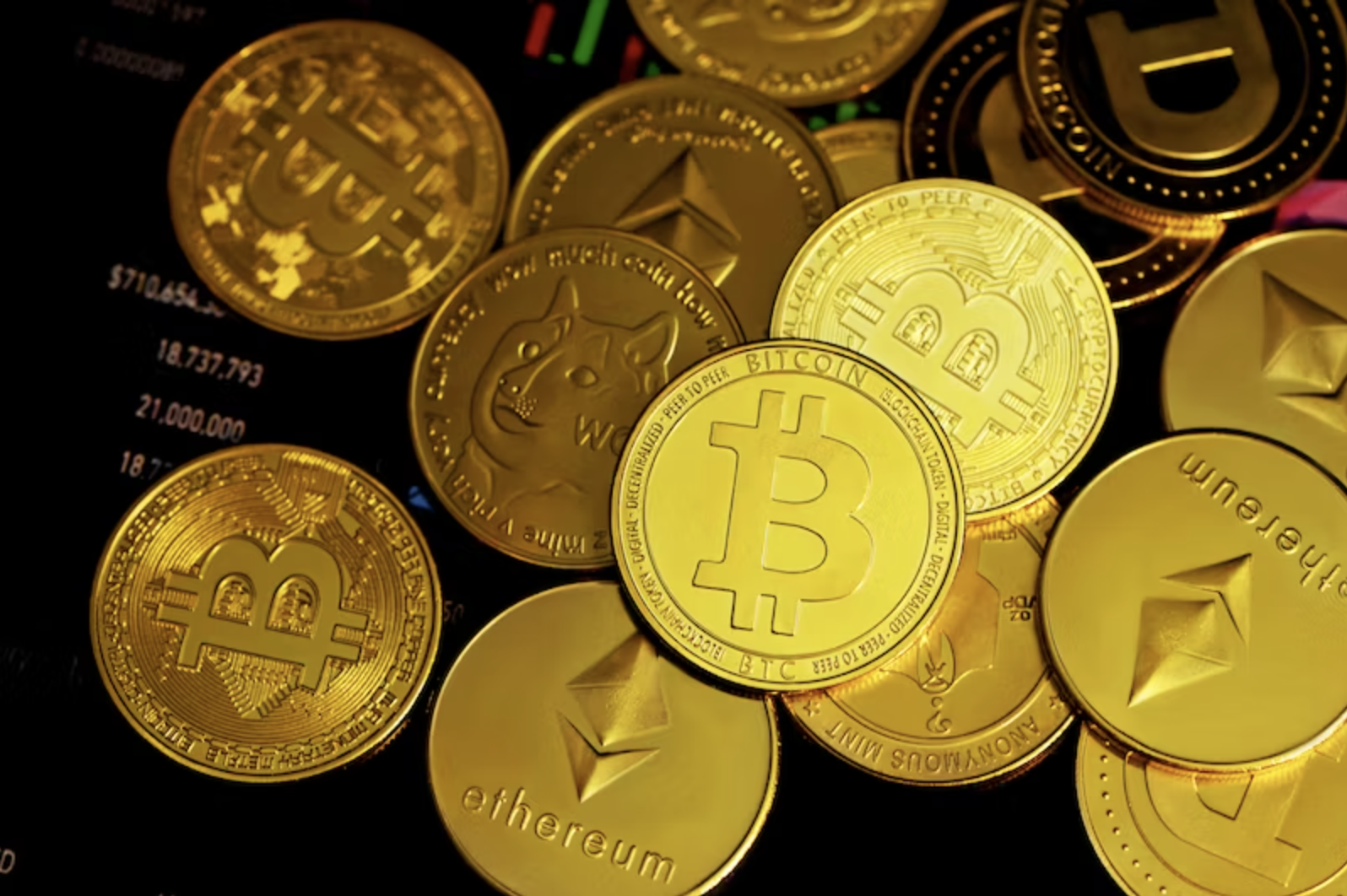Role Of Cryptocurrency In Online Gaming
The adoption of cryptocurrency in online gaming industry is transforming gaming sessions and purchases. The blockchain gaming market experienced revenue of $7.1 billion in 2022, with a projected growth of $772.7 billion by 2032.
Author:James PierceReviewer:Camilo WoodFeb 10, 2024365 Shares40.6K Views

The adoption of cryptocurrency in online gamingindustry is transforming gaming sessions and purchases. The blockchain gaming market experienced revenue of $7.1 billion in 2022, with a projected growth of $772.7 billion by 2032.
Game developers are incorporating digital exchange into their platforms to enhance the gaming experience for their players. Cryptocurrency is becoming a key player in the digital entertainment landscape, offering new forms of engagement and monetization.
It is not just changing the game; it could be the future of online gaming, transforming traditional approaches and opening up new possibilities for players and developers.
What Is Crypto Gaming?
Although in-game currency has been around for a while, blockchain technology has opened up new possibilities for crypto game developers to incorporate real-world economics.
When crypto gamers play and win games, they can earn cryptocurrency or non-fungible tokens (NFTs), which are digital assets that belong to the gamer.
Many centralized and decentralized cryptocurrency exchanges allow players to trade in-game digital tokens for stablecoins. One can buy and sell these digital assets on online marketplaces or even convert them to fiat money.
How Does Crypto Gaming Work?
Cryptocurrency and non-fungible tokens (NFTs) are common in these games. Tokens designed specifically for use in gaming are the norm in most crypto games.
Participation in events in the widely played "My Neighbor Alice" game earns players the ALICE token. The ALICE token can be used to purchase virtual goods, NFTs, and avatars within the game.
Integral to the blockchain gaming ecosystem is a mix of web2 and web3 technologies. It is common practice to keep gaming environments and player data on centralized servers. Virtual currency and NFTs (network tokens) are stored on distributed ledgers.
To encourage participation, play-to-earn games offer virtual currency and NFTs as rewards. Because players' rewards can be sold on the secondary market, the play-to-earn model allows them to play for fun while also making money.
Benefits Of Cryptocurrency In Online Gaming
A new era has begun in the online gaming business because of the introduction of cryptocurrency, which is altering the way players engage with online platforms.
Beyond the obvious ease, this integration ushers in a new age of openness, safety, and accessibility that has long been lacking from conventional payment systems. Notable among the many benefits of incorporating cryptocurrency are three:
Fair Gaming
The blockchain, which is at the heart of most cryptocurrencies, is a decentralized, immutable record of all transactions. This quality has spurred the development of provably fair gaming systems, which have dispelled many of the myths and concerns associated with internet gambling.
Cryptographic techniques ensure that game results on these platforms are both tamper-proof and participant-verifiable. After each game, a cryptographic hash is revealed that is associated with that session.
Players can use this hash to see if the game is fair and if the platform hasn't tampered with the results. Because of this openness, gamers may have faith in the online gaming industry, which improves the experience for everyone.
Enhanced Security And Anonymity
Due to its decentralized and encrypted nature, cryptocurrency integration in online gaming offers greater security. Players are more likely to be victims of data breaches when they use traditional payment methods since they demand that they submit sensitive financial information.
The security of participants' financial information is guaranteed by recording cryptocurrency transactions on the blockchain. In addition to lowering the amount of personally identifiable information that may be accessed, they offer a greater level of anonymity by requiring only a wallet address.
Standard Know Your Customer (KYC) information is necessary for centralized gambling businesses to comply with rules. All things considered, accepting bitcoin payments is a smarter and safer option for gamers.
Accessibility To Global Markets
Players are able to participate in online gaming regardless of their location or the laws in their country because cryptocurrencies are decentralized. Conventional forms of payment may be difficult, limited, or outright forbidden in areas with stringent financial constraints.
Players from these regions can now access online gaming platforms without the usual payment barriers thanks to cryptocurrencies, which function independently of any central authority. Formerly disadvantaged players are now able to participate fully thanks to this inclusivity.
Bitcoin and other cryptocurrencies also make cross-border transactions easier. Players can enjoy online gaming on platforms from all over the world without having to worry about expensive transaction fees or currency conversion.
Both players and online gaming operators gain from this accessibility, as it allows them to reach more people around the world and expand into new markets.
Ripple Effect Of Cryptocurrency In Online Gaming
Bitcoin has more than just a transactional impact on online gaming. The fundamental nature of game design and play is being transformed. For example, consider the idea of genuine ownership.
Any virtual goods or in-game progress made in a classic online game will never leave the game. However, NFTs (Non-Fungible Tokens) allow players of blockchain-based games to own, purchase, or sell in-game assets outside of the game itself.
This new use of cryptocurrency in video games is ground-breaking. In a digital economy, players' in-game actions have actual monetary worth, and they also act as consumers.
It's not like playing a video game; it's really immersive. Developers are encouraged to create more immersive and rewarding experiences by redefining the gaming industry with this transformative approach.
Participating in a dynamic digital ecosystem where each action has the potential to make a significant difference is more than just playing a game. A slew of new investors and players are jumping on the bandwagon to discover the crypto age's unrealized gaming potential, thanks to this paradigm shift.
Challenges Of Cryptocurrency In Online Gaming
While the intersection of cryptocurrencies and blockchain technology with the gaming industry holds great potential, it comes with its own set of unique challenges that demand careful consideration.
Regulatory Uncertainty
The gaming industry faces significant challenges due to the lack of clear regulations governing the use of cryptocurrencies and NFTs, with varying acceptance and regulations across countries.
This ambiguity can lead to potential legal issues for developers and players, making it difficult for them to navigate the evolving landscape and limiting players' engagement with these technologies.
Environmental Concerns
Blockchain technology, particularly in proof-of-work systems, has raised environmental concerns due to its energy-intensive nature. Gaming blockchains like Bitcoin require significant computational power, causing increased energy consumption.
The gaming industry's growing adoption of blockchain may contribute to its environmental footprint, raising concerns for environmentally conscious players and stakeholders.
Security Vulnerabilities
Blockchain technology, while enhancing security, is not immune to vulnerabilities like smart contract vulnerabilities, which have been exploited in past games for fraud and theft. Players must be cautious, and developers must regularly update and secure their blockchain systems.
Scams And Fraudulent Activities
The novelty of NFTs and blockchain-based assets has led to potential scams and fraudulent activities, such as fake token sales and misleading investment schemes.
Therefore, it's crucial for players to exercise caution, conduct due diligence, and be aware of potential scams.
Access And Inclusivity
Blockchain-based gaming may face challenges for players with limited access to cryptocurrencies or blockchain technology, necessitating developers and platforms to consider broader accessibility solutions and ensure inclusivity to prevent technological limitations from exclusion.
Scalability
Blockchain technology's integration into gaming ecosystems may cause scalability issues, such as congestion during peak usage, slow transaction times, and high fees.
Developers must address these issues and explore solutions that can handle the demands of a large player base for a seamless gaming experience.
FAQs -
Can I Use Cryptocurrency To Purchase In-Game Items In Online Gaming?
Yes, many online gaming platforms accept cryptocurrencies as a form of payment for virtual goods and in-game items.
What Security Measures Are In Place For Cryptocurrency Transactions In Online Gaming?
Online gaming platforms implement robust encryption and security protocols to safeguard cryptocurrency transactions, ensuring a secure gaming environment.
How Does The Integration Of Cryptocurrencies Impact The In-Game Economy?
The integration of cryptocurrencies can influence in-game economies by introducing decentralized and transparent transaction mechanisms, potentially impacting virtual item values.
Are There Risks Of Fraud Or Scams Associated With Cryptocurrency Use In Online Gaming?
While the use of cryptocurrency adds security, players should be cautious about potential scams or fraudulent activities, emphasizing the importance of due diligence.
Which Cryptocurrencies Are Most Widely Accepted In The Online Gaming Industry?
Popular cryptocurrencies like Bitcoin, Ethereum, and others are commonly accepted in the online gaming industry, providing players with diverse options for transactions.
Final Words
Cryptocurrency in online gaming marks the beginning of a new age and serves as a catalyst for change. Its influence on game design and transaction methods is immense.
Cryptocurrency is leading the charge for a significant shift in the gaming industry. Brace yourself, techies and gamers; a thrilling new era in the digital world is about to begin.

James Pierce
Author

Camilo Wood
Reviewer
Latest Articles
Popular Articles
